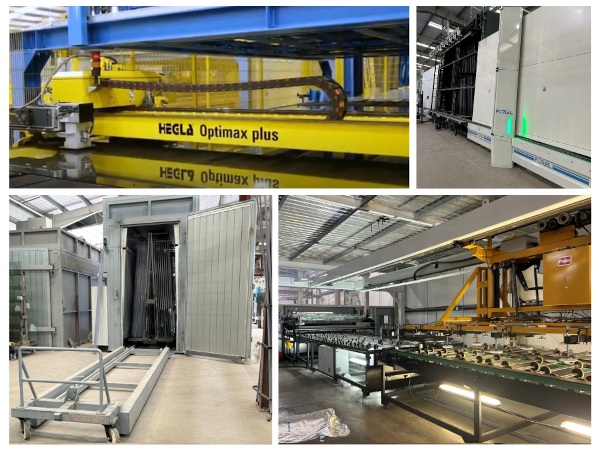Date: 9 February 2009
With this installation at a German PV panel producer, the machine builder has successfully transferred technologies from flat glass processing to the photovoltaic industry.
The new technology is based on Bystronic Armatec’s more than 25-years of experience in engineering machinery and equipment for the production of laminated glass. Here too, pressing the units using a pre-nip system is an important step in the process. Compared to the conventional process using a vacuum laminator, this method of manufacturing solar power modules offers a decisive advantage for the customer: the production cycle time. "Manufacturing production cycles of less than 60 seconds are possible using the pre-nip system, whereas the vacuum laminator requires considerably longer", as Product Manager Thomas Ommerle explains. As a result, significally more or larger vacuum laminators must be used to achieve the same output. This increases both the space and energy requirements for the user..jpg)
Proven Methods with a new Application
Bystronic Armatec draws its substantial experience with the pre-nip process from the construction of machines for the production of laminated glass. "It does not make a difference whether the sandwich consists of glass-film-glass or substrate-film-glass", the Product Manager explains. As is the case in the production of laminated glass, the individual glass sheets are initially washed, positioned with a very high accuracy, and the PVB film is applied completely automatically. During the application Bystronic Armatec does not pre-cut the film but unwinds it directly from the roll, a method that has been proven successful in the manufacture of laminated glass. As a result, the time-consuming storage of pre-cut film for relaxation is no longer necessary. Once the film and the cover glass have been accurately placed on the substrate and the film overhang trimmed the module is conveyed into the pre-nip for the laminating treatment.
.jpg) Combining Heat and Pressure
Combining Heat and Pressure
During the pre-nip process the module passes through a pre-heating zone, three main heating zones and two roller presses. The temperatures in the heating zones range between 130 degrees Celsius and 240 degrees Celsius. Medium-wave quartz infra-red heaters produce the actual heat in the film. Thomas Ommerle explains: "All parameters, such as conveyor speed, pressures or heater settings, can be programmed individually. A constant high production quality is thus guaranteed." Each minute, a module leaves the pre-nip. After that, the glass sheets and the film are bonded permanently at about 140 degrees Celsius and a high pressure of about 13 bar in hot-air autoclaves. While the modules stay there for three or four hours, the next load of 240 pre-laminated modules is being prepared. A harmonious production flow with-out any uneconomical waiting time is thus ensured..jpg)
An investment in the Future
Since December 2008, the manufacturer located in the eastern part of Germany has been producing solar power modules around the clock. And feedback is positive: "They are happy to have chosen our innovative technology", the Product Manager from Bystronic Armatec is pleased to report. We cooperated very intensively during the commissioning phase so that the necessary process reliability could be developed and operators could be trained as skilled specialists within a few weeks", Thomas Ommerle says and adds: "Depending on the requirements of the customer, we offer production systems either with a higher level of manual operation or, except for monitoring the production, with completely automatic operation."







Add new comment